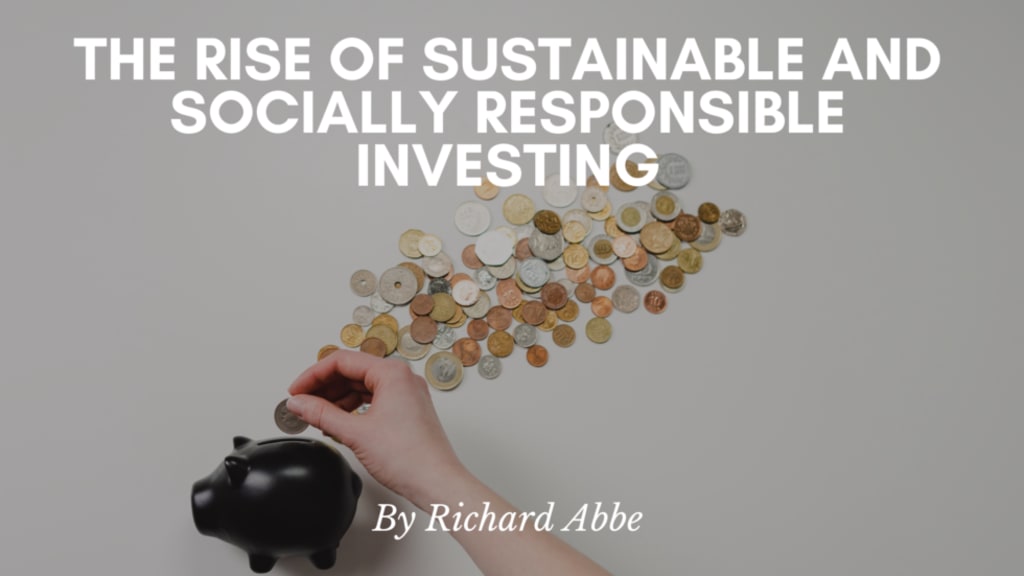The Rise of Sustainable and Socially Responsible Investing
Richard Abbe talks about the growing importance of sustainable and socially responsible investing.

In recent years, there’s been a seismic shift in how people approach investing. Beyond seeking profits, investors are increasingly prioritizing sustainability and social responsibility in their portfolios. This evolving trend, Sustainable and Socially Responsible Investing (SRI), represents a pivotal moment in the financial world.
Understanding Sustainable and Socially Responsible Investing
In investment decisions, SRI considers environmental, social, and governance (ESG) factors. It goes beyond financial returns, aiming to generate positive societal impact while securing financial gains. ESG criteria encompass various issues, from climate change and carbon footprint to labor practices and company diversity.
The Growth Trajectory
The growth of SRI has been exponential. According to recent reports, sustainable investments have surpassed $35 trillion globally, indicating a profound shift in investor preferences. Millennials and Gen Z are the driving force behind this change, emphasizing ethical considerations and sustainability in their investment choices.
Why the Surge in Interest?
Several factors contributed to the surge in SRI’s popularity:
Heightened awareness of climate change and its repercussions has nudged investors to seek eco-friendly and sustainable ventures.
Social movements advocating for equality and fair labor practices have influenced investors to support companies that align with these values.
Studies indicating that SRI doesn’t compromise financial returns have debunked the myth that prioritizing ethics comes at the cost of profitability.
The Impact on Corporations
Corporations are taking notice of this shift. Companies are reevaluating their operations, adopting more sustainable practices, and enhancing transparency in their corporate governance structures. This response isn’t solely driven by altruism; it’s a strategic move to attract SRI-focused investors and secure long-term financial backing.
Challenges and Opportunities
While SRI is gaining momentum, challenges persist. One major hurdle is standardizing ESG metrics across industries, ensuring consistency and reliability in evaluating companies. Additionally, balancing profitability with social impact remains a delicate equilibrium.
However, these challenges also present opportunities. Technological advancements aid in better data collection and analysis, facilitating more accurate assessments of companies’ ESG performances. Furthermore, the rising demand for SRI encourages innovation and the creation of new investment products tailored to these values.
The Role of Individual Investors
Individual investors play a crucial role in propelling the SRI movement forward. By consciously choosing investments aligned with their values, they exert pressure on corporations to prioritize sustainability and social responsibility. Moreover, their collective voice influences institutional investors and fund managers to incorporate ESG considerations into their strategies.
Future Projections
The trajectory of SRI is pointing towards continued growth. As sustainability becomes integral to global agendas, governments, regulatory bodies, and international organizations increasingly emphasize the importance of responsible investing. This collective effort is expected to solidify the SRI landscape further.
The shift to Sustainable and Socially Responsible Investing marks a pivotal juncture in the financial world. It’s no longer just about economic gains; investors seek to create positive change through investment choices. As this movement gains traction, it will undoubtedly shape the future of investing, fostering a world where profitability coexists harmoniously with ethical considerations and societal impact. The evolution of SRI isn’t merely a trend—it’s a transformation reshaping the foundation of investment practices worldwide.
In conclusion, the rise of sustainable and socially responsible investing marks a significant shift in the financial landscape, reflecting a growing awareness of the environmental and social impact of investment decisions. As investors increasingly prioritize not only financial returns but also ethical considerations, businesses and industries are compelled to embrace sustainable practices. This movement not only aligns with a broader societal shift toward conscious consumerism but also holds the potential to drive positive change on a global scale. The future of investing seems poised to be not just financially rewarding but also a force for positive environmental and social transformation.
About the Creator
Richard Abbe
Richard Abbe is an investor, philanthropist, and dedicated family man living in New York City. He co-founded Iroquois Capital Management, LLC, where he is the Principal and Managing Partner.






Comments
There are no comments for this story
Be the first to respond and start the conversation.